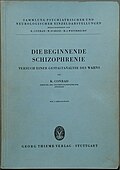Klaus Conrad (psychiatrist)
Klaus Conrad (born June 19, 1905 in Reichenberg ; † May 5, 1961 in Göttingen ) was a German neurologist and psychiatrist with important contributions to neuropsychology and psychopathology . Most recently he was full professor of psychiatry and neurology , director of the University Psychiatric Clinic in Göttingen since 1958.
Life
Klaus Conrad was born in Reichenberg as the son of the economist Otto Conrad . When he was four years old, the family moved to Vienna. After attending the humanistic grammar school, he decided to study medicine after graduating from high school and passed the state examination in Vienna in 1929. A semester of study in London created a permanent connection to the Anglo-Saxon world; so later Henry Head and John Hughlings Jackson gained an important influence on his scientific thinking. He began his career at the Vienna Clinic under Otto Pötzl (1877–1962) and continued at the Magdeburg Psychiatric Clinic. After studying at the Hôpital Salpêtrière in Paris , he came to the German Research Institute for Psychiatry in Munich in 1933 , where he conducted research on the hereditary nature of epilepsy. The results of his work could be used to justify compulsory sterilization within the framework of the “ Law for the Prevention of Hereditary Diseases ”. Conrad joined the Nazi lecturers' association and was a shop steward there. In 1939 he published an article on the genetic spectrum of epilepsy in the Handbuch der Erbbiologie . In the same year Ernst Kretschmer brought him to the University Psychiatric Clinic in Marburg as a senior physician , and Conrad became a member of the National Socialist Medical Association . In 1940 he became a member of the NSDAP . He had shortly before his call-up for service completed as a medical officer, a monograph A year later, in which he own theory about the occurrence described by Ernst Kretschmer constitutional types designed.
As head of a special hospital for the brain injured , Conrad had more than 800 carefully self-processed cases with brain injuries at the end of the war , of which more than 200 had aphasic disorders that were intensively analyzed for months. Time and again Conrad found new methodical ways to track down the gestalt psychological laws of the various forms of aphasia, the disturbed word finding and alexia . In his structural analyzes of brain pathological cases (1947–1949), he laid the groundwork for a general psychopathology based on brain pathology based on gestalt theory .
In 1948 Klaus Conrad was appointed to the newly created chair for psychiatry and neurology at Saar University ; In 1958 he succeeded Gottfried Ewald as director of the University Psychiatric Clinic in Göttingen. In the same year, at the annual meeting of psychiatrists in Bad Nauheim , he proposed that the nosological separation of schizophrenia and cyclothymia be finally abandoned.
His main work is The Beginning Schizophrenia. Attempt to analyze the shape of madness (1958). The study describes the early stages of schizophrenia as well as regular, typical schizophrenic courses. From this monograph, the terms "Trema", "Apophänie" and "Überstieg" have been adopted in psychiatric usage.
Just under a year before his death, The Symptomatic Psychoses appeared in the second volume of Contemporary Psychiatry . Conrad was convinced that access to the psychosis problem is only possible through brain pathology , and thus brought phenomenological psychopathology back to medical and scientific ground.
In 1961 Conrad was supposed to become director of the Max Planck Institute for Psychiatry in Munich , but he died before taking up the post.
His marriage to Martha Conrad had four children (Gisela, Bastian , Monika and Ursula).
Fonts (selection)
- with Josef Lothar Entres , Ferdinand Adalbert Kehrer , Friedrich Meggendorfer , Kurt Pohlisch : Die hereditary epilepsy . The Erbveitstanz (Huntington's Chorea). Heavy alcoholism (= Handbook of Hereditary Diseases. Ed. By Arthur Gütt . Vol. 3/6). Thieme, Leipzig 1940.
- The constitution type as a genetic problem. Attempt of a genetic constitution doctrine. Springer, Berlin 1941.
- The unconscious as a phenomenological problem. In: Advances in Neurology and Psychiatry. 25: 56-73 (1957).
- "Occult" phenomena in the light of gestalt psychological research. In: Journal for experimental and applied psychology, Volume 4 (1957), pp. 363-383.
- Gestalt analysis and Daseinanalysis. In: The neurologist . 30: 405-410 (1959).
- The symptomatic psychoses. In: Hans W. Gruhle (Ed.): Psychiatry of the present. Vol. 2, Springer, Berlin 1960, pp. 369-436.
- The beginning schizophrenia. Attempt of a gestalt analysis of madness (= collection of psychiatric and neurological individual representations ). Thieme, Stuttgart 1958; last: unchanged new edition, 4th edition. Ed. The Ship of Fools in Psychiatrie-Verlag, Bonn 2013, ISBN 978-3-88414-525-8 .
literature
- Mathias Sambale: Gestalt Psychology in Neurology. A study of the history of ideas based on the writings of Klaus Conrad. Thuringian University and State Library Jena, Jena 2015 (medical dissertation, University of Jena, 2014).
Web links
- Conrad, Klaus. Hessian biography. (As of November 28, 2019). In: Landesgeschichtliches Informationssystem Hessen (LAGIS).
Individual evidence
- ↑ a b c Ernst Klee : The dictionary of persons on the Third Reich. Who was what before and after 1945 . Fischer Taschenbuch Verlag, second updated edition, Frankfurt am Main 2005, pp. 95–96.
- ↑ See: The theory of Conrad, in: Reinhard J. Boerner (2015), Temperament. Theory, research, clinic , Berlin-Heidelberg: Springer, pp. 141–144; see also AL Mishara: Klaus Conrad (1905-1961): delusional mood, psychosis, and beginning schizophrenia. In: Schizophrenia bulletin. Volume 36, number 1, January 2010, pp. 9-13, doi : 10.1093 / schbul / sbp144 , PMID 19965934 , PMC 2800156 (free full text).
| personal data | |
|---|---|
| SURNAME | Conrad, Klaus |
| BRIEF DESCRIPTION | German neurologist and psychiatrist |
| DATE OF BIRTH | June 19, 1905 |
| PLACE OF BIRTH | Reichenberg |
| DATE OF DEATH | May 5, 1961 |
| Place of death | Goettingen |


